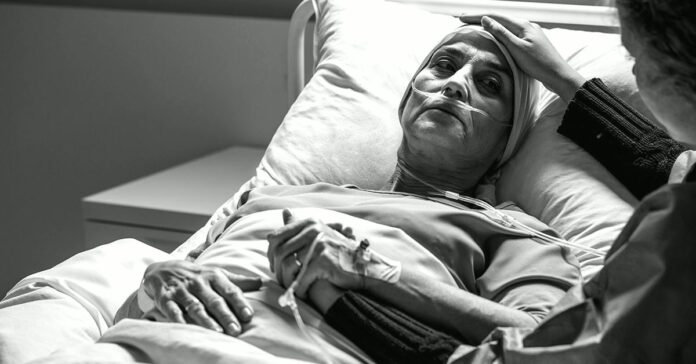Life and death are surprisingly complex elements, often leaving people wondering if they did it correctly. A hospice nurse has revealed the last thing more than 100 people have said in the moments before their passing. Interestingly, it sheds light on what’s important in life.
Notable Nurse Jackie

A hospice nurse named Jackie McFadden has more than 2.5 million followers across her social media accounts, which she uses to share some interesting tidbits about her work, and the patients she encounters. Nurse Jackie specializes in “end-of-life” care and has used the platforms to “remove the stigma around death.”
Gratitude is Essential to Life

She recently appeared on the podcast “Disruptors” to speak with Rob Moore, in which she shared a heartwarming moment that she’s incorporated into her nightly routine with residents. The nurse sits with her residents nightly to create a gratitude list. “I like the fact that I can breathe, I’m walking around, I can feel the sunshine – little things like that,” she shared. “I think the biggest thing I hear from people [who are] dying is that they wish they would have appreciated how well they how well they felt before.”
A Nurse Needs Reminders

Despite her reminders, nurse Julie admittedly “takes life for granted.”
“I think because of my job it’s easier for me to see how a once in a lifetime this is the fact that everything works together in our bodies to make us live and grow um and I see that in depth too I see how our bodies are biologically built to die.” She said
Book of Guidance

Nurse Julie doesn’t only share what the “hundreds” of people she’s worked with in their final moments have said. She also shares information regarding the difficult task of accepting death. The Nurse wrote a book called Nothing to Fear, a tool to aid others in processing death. “I believe that people should know about the dying process before they’re actually going through it with a loved one or themselves.” She explained.
A Nurse in Favor of the Afterlife

Before becoming a hospice nurse, she worked in the ICU, sadly a place where death also often occurs. In her book, she notes many of her difficult experiences throughout her career. However, her numerous experiences with death have brought on a realization that many people battle with regularly. Nurse Jackie explained her belief that the afterlife is real and came to the conclusion from her many experiences with those taking their final breaths.
Sad Realities of U.S. Healthcare

Hospice nurse Julie notes other interesting aspects of the dying process, particularly for those in the U.S. “Generally speaking it helps to have money to die well which I think is really unfortunate,” she admits, noting that many families devote themselves to caring for a loved one on hospice. However, in many cases, they aren’t qualified to do so. Nor, are many families in the U.S. financially capable of providing care. Only people with pretty extreme wealth can do that, which I think is really unfortunate. So I don’t think money does make you happy, but it helps it certainly takes stress off of the situation,” Julie said.
Signs of Oncoming Death

Although Nurse Jackie is an expert in death, and helping families cope with the challenges that arise, she’s also an expert at knowing the signs of death. In a video she posted to her social media, she pointed out some signs of death, including shortness of breath and a noticeable color change.
Another Nurse Sheds Light

According to VeryWellHealth, here are some other signs to look out for, when you think a loved one is close to passing on.
- They go into a state of isolation.
- Experience extreme Pain.
- Sleep often or are Fatigued.
- Have a Loss of Appetite.
- They easily suffer from Dehydration
- Or experience Loss of Muscle Control/Blader/Bowel Movements
- Nausea or vomiting
- Confusion or Delirium- they can become restless, agitated, feel lost, or not recognize where they are.
Emotional Support

Nurse Jakie’s book is a great resource for helping people move through death or losing a loved one. She notes some important topics and addresses pressing questions. However, many resources are available to help people cope with loss or terminal illness. For example, many doctors’ offices or hospitals hold weekly meetings for people suffering from an illness or losing a loved one. Additionally, national hotlines like (800) 658-8898 and CaringInfo are available to help those dying or their loved ones to make the right decisions regarding medical care and the future.

